
Cricket was first played in Gibraltar by the military in the late eighteenth century. Although the British presence dates to 1704, it is unlikely that cricket started earlier than 1783 when the four-year long Great Siege came to an end. The first official record of cricket is not until 1822 when the Gibraltar Chronicle and Commercial Intelligencer reported that the next game by Gibraltar Cricket Club would take place on July 6th at the Neutral Ground, land which once included a racecourse but which was taken over by the airfield and associated RAF buildings during the Second World War.
Both civilians and the military were clearly playing cricket by this time because, one week later, the Civilians challenged the Officers to a match. Shortly after, the military formed the Garrison Cricket Club and the civilians, the Calpe Cricket Club which in 1858 became the Gibraltar Cricket Club.
The first cricket match against an overseas team occurred literally by accident. In April 1890 WL Murdoch’s Australian cricket team called into Gibraltar on their way to England for their summer tour but their liner, the Liguria, collided with two other ships while entering the harbour. Whilst repairs were being carried out, the Australians played a one-day match against The Garrison.
Despite batting seventeen the Garrison had no answer to the speed of CBT Turner (9-15) and JJ Ferris (5-10) and were dismissed for 25. Australia then made 150 for the loss of eight wickets by the close, Briscoe taking four wickets for 49 runs.
Following this encounter, Gibraltaran cricket remained isolated for twenty-seven years. Nevertheless standards slowly improved and some of the local-born population began to play and join Gibraltar CC. Visits were made by the Cryptics in 1927, HDG Leveson-Gower’s side in 1932 and a team raised by G.O.B Allen in 1935. All played matched against The Rock, as the combined military and civilian team was known. The late 1930s saw Gibraltar travel overseas to play matches in Portugal against British residents in Lisbon and Oporto. Before any return visits could be organized, WWII intervened and cricket in Gibraltar ceased.
After the War, Gibraltar CC moved to a new ground, the Victoria Stadium, next to the airfield. Matches between GCC and the Combined Services started, new civilian cricket clubs were formed and visits from British county and club sides became more regular. The need for an overall organising body for civilian cricket was recognised and in 1960 the Gibraltar Cricket Association was formed.
With the cutback in the size of the British military personnel stationed on the island, the future of cricket became more dependent on the local population, but unfortunately cricket stopped being taught in schools in the 1960s.
They were elected an Associate Member of the ICC in 1969 and were due to take part in the ICC Trophy that year but were forced to withdraw due to a clash with a hockey tournament for which several people were required. The need to meet ICC’s eligibility criteria weakened the teams which competed in the ICC Trophy throughout the 80s and 90s, which meant they won only six matches out of 32, and saw themselves being skittled by Kenya for just 44 in Malaysia in the 1997 event.
The sport received a boost with the re-introduction of cricket to the school curriculum and a youth development programme was initiated. In 1992 they played their first home international against another Associate when they lost to Israel by three wickets.
They have been tournament regulars participating in no fewer than 16 ICC Europe events since 1996, with their greatest success coming in 2000 and 2002 when they won and defended the Division Two Championships in Scotland and Northern Ireland.
The pen pics for their successful squad in 2000 were as follows:
Gibraltar Squad
Christian Rocca (captain): An aggressive top-order batsman who first represented Gibraltar in the 1986 ICC Trophy and was also selected for the ICC Trophy in Holland in 1990. He took over the captaincy for the 1996 European Championships in Denmark and retained it for the 1997 ICC Trophy in Malaysia and the 1998 European Championships in Holland. 44 one day international appearances.
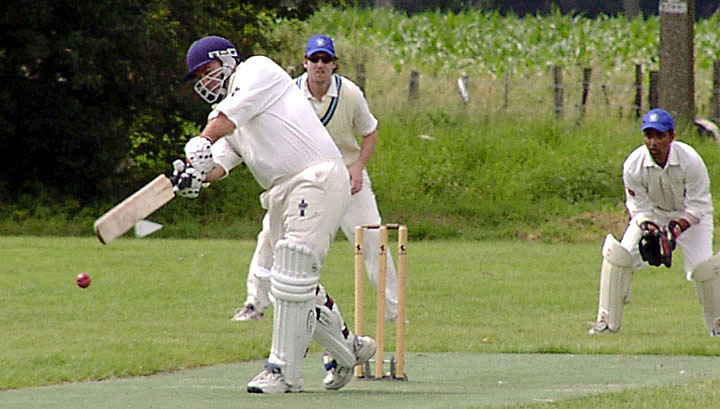 Christian Rocca batting against Israel in 2004 (© CricketEurope)
Christian Rocca batting against Israel in 2004 (© CricketEurope)
Gareth Balban: Age 19. Right hand opening bowler and right hand middle-order bat. 10 one day international appearances. Made his debut at the 1998 European Championships at the age of 17. One of the outstanding products of the Gibraltar Cricket Association youth development programme.
Paul Buttigieg: Age 19. A promising right hand batsman and a potential right hand spin bowler. 6 one day international appearances. Made his debut at the 1998 European Championships at the age of 17. Yet another product of the Gibraltar Cricket Association youth development programme.
Richard Buzaglo: Age 34. One of the most experienced members of the side, having represented Gibraltar in every ICC Trophy since 1986 as well as in two European Championships. An attacking top-order batsman, a superb fielder and has also kept wicket for Gibraltar. 53 one day international appearances.
Steve Cary: Age 32. A strong right arm medium paced bowler and an excellent fielder. He first represented Gibraltar at the 1997 ICC Trophy in Malaysia and was selected for the 1998 European Championships. 11 one day international appearances.
Gary De'Ath: Age 42. Left hand middle-order batsman and slow right arm bowler. He has represented Gibraltar in all ICC Trophy tournaments since 1986 as well as both European CHampionships. 48 one day international appearances.
Steven Gonzalez: Age 17. A promising right hand batsman and medium pace bowler who is making his debut at senior international level, although he represented Gibraltar at the European Under 19 Championships in N Ireland in 1999. Another product of the Gibraltar Cricket Association youth development programme.
Philip Hudson: Age 25. A top-order left hand batsman and right hand medium pace bowler. A fine cricketer in his own right, he is doing sterling work with Gibraltar's youngsters as part of the Gibraltar Cricket Association youth development programme.
Daniel Johnson: Age 20. An extremely talented all-rounder, he first represented Gibraltar aat the age of 16 in the 1996 European Championships. He was also selected for the 1997 ICC Trophy in Malaysia and the 1998 European Championships.
Piers Moore: Age 36. A right arm fast-medium bowler and right hand aggressive batsman. A qualified coach who has been putting the Gibraltar squad through its paces.
Rex Purnell: A slow left arm bowler, middle-order batsman and good fielder who made his debut for Gibraltar in the quadrangular tournament held on the Rock in September 1999. 3 one day international appearances.
Dave Robeson: Age 23. A right hand opening batsman and occasional bowler. First represented Gibraltar in the 1996 European Championships and was aslo in the squad at the 1997 ICC Trophy.
Roy Rodgers: Age 36. A strong and aggressive right hand opening bowler. Made his debut for Gibraltar in last year's quadrangular tournament. 4 one day international appearances.
Chris Watkins: Age 32. A fine top-order batsman and more than useful seam bowler. Can also keep wicket. 4 one day international appearances.
Tom Finlayson: Manager. Honorary Secretary of the GCA from 1982 to 1989 and now Chairman. Represented Gibraltar in the 1982 ICC Trophy and has managed every Gibraltar tour since then.
Richard Cox: Coach. Gibraltar's National Coach at the ICC Trophy in 1994 and 1997 and the last two European Championships.
John Shephard: Umpire. First took up umpiring last year at the age of 27.
Eddie Wilson: Scorer. His first taste of international scoring.
Highlights of their win included fine bowling displays by Rex Purnell who took five wickets against Greece and four against Israel, and fine batting by Richard Buzaglo, Christian Rocca, Phil Hudson and Daniel Johnson.
Their title defence looked in trouble when after losing to Portugal they were on the verge of being beaten by Germany in the 2002 tournament but five wickets from Dave Mathers sealed a six-run win and they would go on to win the tournament.
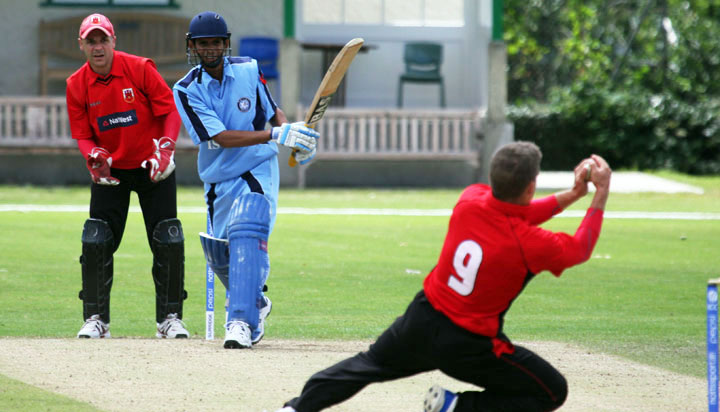 Iain Latin takes a stunning caught and bowled against Israel in 2010 (© CricketEurope)
Iain Latin takes a stunning caught and bowled against Israel in 2010 (© CricketEurope)
Subsequent Division Two campaigns saw them finish fifth, fourth, third and sixth. Highlights of these included 2004: Christian Rocca 97 v France, while in the same game Richard Buzaglo took six catches and a stumping, his seven dismissals in an innings being a European record.
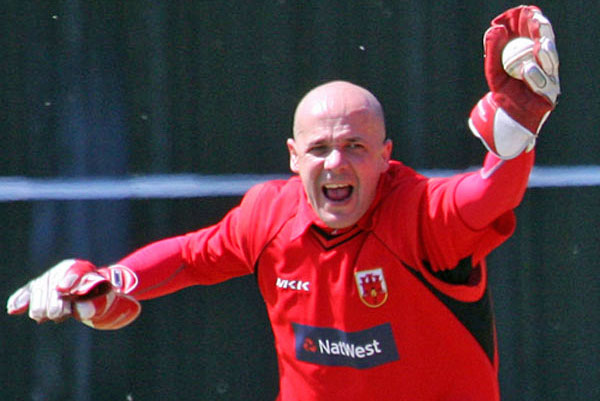 Richard Buzaglo (© CricketEurope)
Richard Buzaglo (© CricketEurope)
They found themselves taking part in the World Cricket League Division Seven in 2009 but won only one game which saw them relegated. They did have two noteworthy individual bowling performances though as Iain Latin took six wickets against Suriname, while Kabir Mirpuri also claimed six against Nigeria.
In Division Eight in Kuwait they struggled again, finishing sixth, and although their bowlers struggled Kieron Ferrary hit 105 versus Zambia and Christian Rocca 99 against Germany. Their final involvement came in 2012 in the Division Eight (Europe) tournament as they finished third behind Belgium and France.
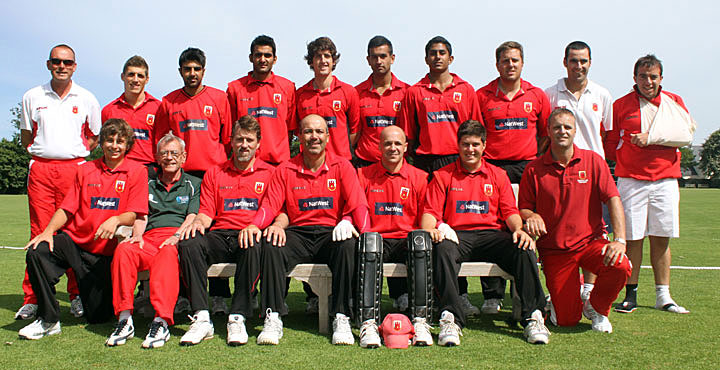 The Gibraltar squad at the 2010 European Championships (© CricketEurope)
The Gibraltar squad at the 2010 European Championships (© CricketEurope)
The switch to T20 cricket didn’t favour their style of play, and they finished 9th out of 12 teams in Division One in 2011, while in 2013 their tenth place finish saw them relegated. Kayron Stagno hit 94 not out against Sweden sharing an opening stand of 160 with Kieron Ferrary.
There was great sadness in the squad in early 2013 with the news of the passing of Gary De’Ath at the age of 55.Gary was a competitive hard-nosed combatant, whose accuracy and consistency made him ‘Mr Reliable’ in over 20 years with the national side. In total he played 65 one-day games, and featured in five ICC Trophy tournaments and also five European Championships.
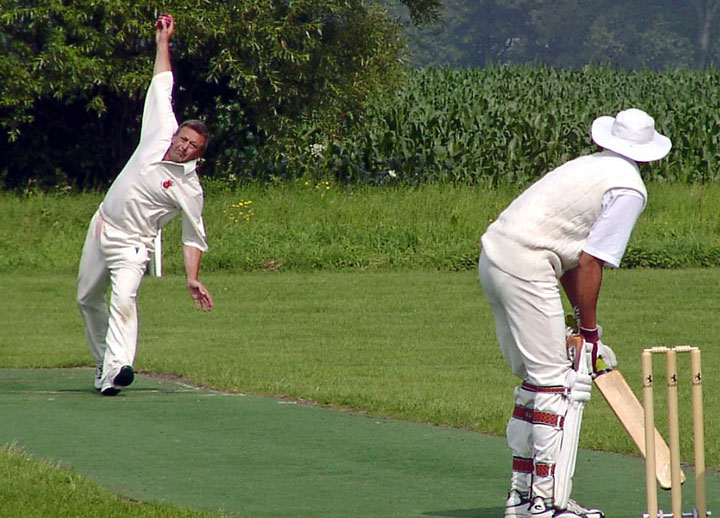 Gary De'Ath (© CricketEurope)
Gary De'Ath (© CricketEurope)
They endured a miserable Division Two tournament in Stockholm in 2016, where they lost all five games, including one against Spain by seven runs despite a five-wicket haul by Ferrary.
They were part of the 18-team Division One tournament held in The Netherlands in 2018, where they finished bottom of their group, winning just one game against The Czech Republic thanks to the efforts of Balaji Pai.
Their last action to date came in 2019 when along with hosts Spain, and Portugal they played four T20 Internationals as they competed for the Iberian Cup. Unfortunately they lost all four games, and currently sit at 79th in the ICC Rankings table.
This article was first written by Roy Morgan in 2006 and has been updated by CricketEurope.

